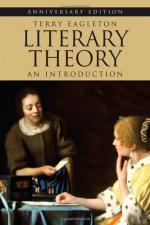
|
| Name: _________________________ | Period: ___________________ |
This test consists of 15 multiple choice questions and 5 short answer questions.
Multiple Choice Questions
1. According to Eagleton, as the first industrialist capitalist nation, England becomes what kind of state?
(a) A police state.
(b) A wealthy state.
(c) A perfect state.
(d) A free state.
2. According to Eagleton, Stanley Fish's model excludes the possibility that there is a ______ of interpretations?
(a) Struggle.
(b) Dominance.
(c) Rejection.
(d) Acceptance.
3. According to Eagleton, what idea is "truly elitist" in literary studies?
(a) "The idea that literature is the only way to understand a particular culture."
(b) "The idea that literature can only be understood by writers of literature."
(c) "The idea that literature should not be read by those without a higher degree."
(d) "The idea that works of literature can only be appreciated by those with a particular sort of cultural breeding."
4. How many decades, according to Eagleton, has there been a "striking proliferation of literary theory" since the publication of the Russian formalist's pioneering essay?
(a) One.
(b) Five.
(c) Two.
(d) Six.
5. Eagleton provides the analogy of finding a "scrap of writing from a long-vanished civilization" to make what point about deciphering its meaning?
(a) That we would be able to see that poetry didn't exist by looking at its language.
(b) That we would not know whether it was a piece of poetry or ordinary language.
(c) That we would be able to tell that it was a piece of poetry regardless of access to its language.
(d) That we would be able to learn that it was a piece of poetry by looking at the language.
6. What is the name of the American hermeneuticist E.D. Hirsch Jr.'s famous 1967 book?
(a) "Being and Time."
(b) "Validity in Interpretation."
(c) "Truth and Fact."
(d) "Meaning or Method."
7. According to Eagleton, "theory was a way of _______ literary works from the ________of civilised sensibility'"
(a) Emancipating; stranglehold.
(b) Excluding; oppression.
(c) Studying; truth.
(d) Dismissing; idea.
8. What three sequential stages does Eagleton point out in the development of modern literary theory?
(a) The preoccupation with the critic, the exclusive concern with the author, and a shift toward the text.
(b) The preoccupation with the author, the exclusive concern with the text, and a shift toward the reader.
(c) The preoccupation with the reader, the exclusive concern with the text, and a shift toward the critic.
(d) The preoccupation with the text, the exclusive concern with the reader, and a shift toward the author.
9. According to Eagleton, "In the late sixteenth and early seventeenth centuries, the word ______seems to have been used about true and fictional events."
(a) News.
(b) Memoir.
(c) Theory.
(d) Novel.
10. During the 1960s, what kind of students began to enter higher education that broke down assumptions about literary studies?
(a) Students from supposedly "first-world" countries.
(b) Students from supposedly "cultivated" backgrounds.
(c) Students from supposedly "third-world" countries.
(d) Students from supposedly "uncultivated" backgrounds.
11. What genre of writing does Eagleton provide that is an example of writing that is NOT considered to be literature?
(a) Romance.
(b) Science fiction.
(c) Young Adult.
(d) Comics.
12. What is the name Edmund Husserl gave to his philosophical method?
(a) Hermeneutics.
(b) Phenomenology.
(c) New criticism.
(d) Reception theory.
13. According to Eagleton, when did the Russian formalists emerge?
(a) After WWI.
(b) Before WWII.
(c) During the Russian Revolution.
(d) Before the Bolshevik Revolution.
14. According to the Russian formalist Osip Brik, Pushkin's "Eugene Onegin" would have been written if Pushkin had what?
(a) Married early.
(b) Been uneducated.
(c) Died young.
(d) Not lived.
15. For Eagleton, Gadamer's theory only holds if one makes what "enormous assumption"?
(a) That there is a single, mainstream modernity.
(b) That there are multiple traditions.
(c) That there is a single, mainstream tradition.
(d) That there are multiple modernities.
Short Answer Questions
1. According to Eagleton, what kind of age do we live in, where "meaning, like everything else, is expected to be instantly consumable"?
2. Who is the key figure in the Victorian period Eagleton cites as "preternaturally aware of the needs of his social class"?
3. For Eagleton, E.D. Hirsch attempts to "offer a form of knowledge" that is what?
4. What word does Eagleton discuss that is both a descriptive term to mean "literally untrue" as well as an evaluative term to mean "visionary" or "inventive"?
5. According to Eagleton, who "harnessed this Romantic humanism to the cause of the working class" in the late nineteenth-century?
|
This section contains 691 words (approx. 3 pages at 300 words per page) |

|




